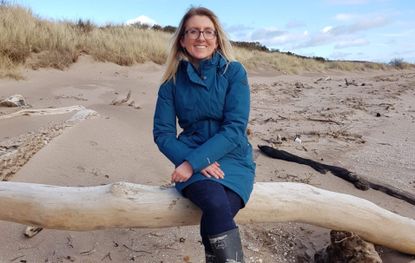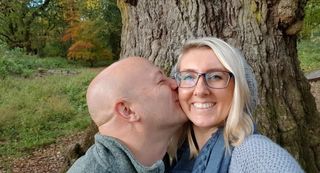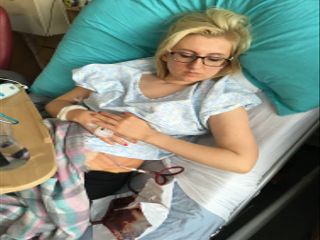'I realised I hadn’t been living at all' How ovarian cancer taught one woman to totally transform her life
A devastating ovarian cancer diagnosis taught Fi Munro, 34, how to really live. Here she shares her inspirational story about how she changed her life.

A devastating ovarian cancer diagnosis taught Fi Munro, 34, how to really live. She shares her inspirational story.
As a group of bottlenose dolphins took turns to dive into the air and splash back down, I watched in awe.
‘Now, this is what life’s about,’ I grinned to my husband, Ewan, then 46, as we climbed back into our bright-yellow Volkswagen camper van.
‘I’ve never seen anything like it,’ Ewan smiled from the driver’s seat as we continued our 500-mile loop around the Scottish coastline.
Growing up in Scotland, I’d always dreamt of touring the North Coast 500 – one of the world’s most iconic coastal routes – in a VW camper, but had never got round to it. Work, social commitments, and training for marathons meant I’d always put it off ‘until next year’ – until the day I learned my ‘next years’ were running out.
I’d known something was wrong for months before I got the diagnosis.
It’d started with a ruptured ectopic pregnancy in August 2015. Ewan and I were devastated as we’d been trying for a baby. I’d needed emergency surgery to remove the baby and my left fallopian tube, and afterwards, we allowed ourselves to grieve, yet the physical pain didn’t fade.
GoodtoKnow Newsletter
Parenting advice, hot topics, best buys and family finance tips delivered straight to your inbox.
I visited the GP with abdominal pains and swelling – but, aged 30 and with no family history of ovarian cancer, it was months before I was sent for tests.

Then, in January 2016, I got the diagnosis. The word ‘cancer’ rang in my ears as the consultant explained it’d started in my left ovary before spreading to my pelvis, abdomen and chest.
‘It’s incurable,’ he said while I gripped Ewan’s hand. My cancer was advanced and could only be managed with chemotherapy. In other words, I was dying.
Somehow, I held it together, even managing to crack a joke to Ewan about getting a dog, relying on my dark sense of humour to get me through.
The consultant took us through the next steps, but I barely heard any of it. Ewan looked just as stunned, and I vaguely remember a nurse bringing tea as we were told I’d be admitted the next day.
The worst thing, though, was getting home and phoning loved ones with the news. Hearing their muffled sobs as they tried to stay strong for me was unbearable.
‘We’re all here for you,’ Ewan said as I tearfully put the phone down to my parents, who were on holiday in Spain and instantly set off on the long drive home. I felt surrounded by such love and support that when I arrived at Ninewells Hospital the following day, I felt ready for what came next.
It was gruelling, though. My hair, eyelashes and eyebrows fell out within weeks of chemotherapy starting, and looking at my reflection, I felt like a stripped-back version of myself.
It struck me how quickly my life had changed. Just three weeks earlier, I’d been a high-flying user-research lead for the Scottish Government, training for marathons in my spare time; now, I was an exhausted and ravaged cancer patient with an uncertain, and possibly short, future. My work clothes remained in the wardrobe, my four-hour commute a distant memory.

Finding joy in every day
Yet, with my previously hectic schedule pushed aside, having been signed off work for a year, I actually had space to reflect on myself for the first time in years. ‘I don’t want to wallow,’ I told Ewan. I still had hopes and dreams, and if I didn’t have long left, then
I was going to find joy in every day.
I poured my positivity into a blog Live Like You're Dying and allowed messages of support to buoy me when I couldn’t move from the bathroom floor in case I threw up.
In May 2016, surgeons at Aberdeen Royal Infirmary removed my cervix, womb, right fallopian tube, spleen, omentum (tissue that connects the stomach and other organs), appendix, and parts of my bowel, liver, diaphragm and pancreas.
It was a drastic bid to stop the cancer spreading further and waking up in the High-dependency Unit, I felt the enormity of the 12-hour op in every inch of my body. I had a colostomy bag and wouldn’t be able to walk for weeks.
Bed-bound, I thought about all I’d achieved, and those things I wished I’d done but never got round to. That’s when I realised: I hadn’t been living at all, I’d been on a hamster wheel, working a corporate job to fund a lifestyle that didn’t truly make me happy, punishing my body with marathon running to fit society’s idea of what it meant to be attractive.
Deep down, I’d always wanted to teach yoga, but was always too worried about what people would think. Having gained a PhD at 25,
I was expected to have a career in academia, and going down a spiritual path would have shocked everyone, me included. Now, I realised how stupid that was. ‘As soon as I’m strong enough...’
I thought, and 12 weeks later, I started a yoga-teaching course. Doctors said I’d still be bed-bound, but I was up and about, learning the physical and mental theories – and using it to heal my body.
In August 2016, I started a year-long training course, and when I qualified, started holding my own one-to-one classes in Tayside, as well as yoga retreats around Scotland. By now, I was in remission, in hospital every three weeks for an intravenous maintenance drug.
My transformation
Next, I turned my blog into a book about everything cancer had taught me so far, and Love, Light and Mermaid Tails was published in August 2017. Within a year, cancer had turned me into a yoga teacher and author, things I’d only dreamt of.
Ewan and I had come to terms with not having a family and started planning the things we wanted to do, every country we wanted to see.
In September 2016, we went on a Mediterranean cruise, visiting Lisbon and Tenerife, then travelled around Italy and France by train in February 2017, and cruised around Norway in October. And then, last August, we spent two weeks touring the Scottish coast, spotting the dolphins off Chanonry Point.
Living in the moment wasn’t just about travelling, though. I took joy from the little things, like green leaves sprouting from trees, going to my nephews’ and niece’s school plays – something I’d never have found time for before cancer. I also wrote another book, How Long Have I Got?: The Story of a ‘Terminal’ Cancer Patient, about finding light in the darkness of cancer.
Last December, tests revealed tumours on my lungs, so I’ve started chemo again. There’s not much more doctors can do to stop the cancer spreading, and I don’t know what the future holds, but whatever happens, I know I’m finally living my life as I should be.
It’s like I spent 30 years asleep, and it took a terminal diagnosis to wake me up. I feel like I’ve been given a gift, so I’m dedicating the rest of my time to spreading awareness of ovarian cancer symptoms, and encouraging everyone to live like me: like they’re dying.
The annual campaign, led by Target Ovarian Cancer, runs throughout March. There’s no screening for ovarian cancer, which affects around 25,000 women in the UK. So knowing the symptoms is vital: persistent bloating, feeling full or loss of appetite, pelvic or abdominal pain, and needing to wee more often or more urgently than usual.
-
 Compromising may be killing your relationship - here are 5 ways to reach healthy compromises, according to relationship expert
Compromising may be killing your relationship - here are 5 ways to reach healthy compromises, according to relationship expertCompromising isn't always the best way to keep the peace in a relationship
By Charlie Elizabeth Culverhouse Published
-
 Best interactive pets for kids: 15 gift ideas for children of all ages
Best interactive pets for kids: 15 gift ideas for children of all agesFrom puppies to axolotls, take a look at our selection of the best interactive pets you can buy that are sure to be a hit with little animal lovers
By Sarah Handley Published